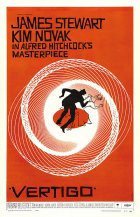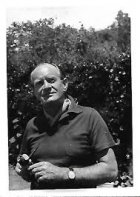
Vertigo Page #2
- PG
- Year:
- 1958
- 128 min
- 4,244 Views
MIDGE:
No, it's your life. But you were the
bright young lawyer who decided he
was going to be chief of police some
day.
SCOTTIE:
(Gently)
I had to quit, Midge.
MIDGE:
Why?
SCOTTIE:
I wake up at night seeing him fall
from the roof... and try to reach
out for him.
MIDGE:
It wasn't your fault.
SCOTTIE:
MIDGE:
Johnny, the doctors explained --
SCOTTIE:
I know. I have Acrophobia. What a
disease. A fear of heights. And what
a moment to find out I had it.
MIDGE:
Well, you've got it. And there's no
losing it. And there's no one to
blame. So why quit?
SCOTTIE:
And sit behind a desk? Chairborne?
MIDGE:
It's where you belong.
SCOTTIE:
(With a grin)
Not with my Acrophobia, Midge. If I
dropped a pencil on the floor and
bent down to pick it up, it could be
disastrous!
MIDGE:
(Laughs)
Ah, Johnny-O...
She considers him for a moment, then goes back to her work.
By now he is up and wandering about with the help of the
stick.
MIDGE:
(Finally, as she works)
Well?... what'll you do?
SCOTTIE:
Nothing for a while. You forget, I'm
a man of independent means. Or fairly
independent.
MIDGE:
Mmm. Why don't you go away for a
while?
SCOTTIE:
(Grins)
To forget? Don't be so motherly,
Midge. I'm not going to crack up.
MIDGE:
Have you had any dizzy spells this
week?
SCOTTIE:
I'm having one now.
She looks up sharply with quick apprehension.
SCOTTIE:
From that music.
MIDGE:
Oh!
She goes and turns off the gramophone. Scottie has wandered
over to the drawing table.
SCOTTIE:
What's this do-hickey here?
He turns the brassiere over with his stick
MIDGE:
It's a brassiere. You know about
those things. You're a big boy, now.
SCOTTIE:
I've never run across one like that.
MIDGE:
It's brand new. Revolutionary uplift.
No shoulder straps, no back straps,
but does everything a brassiere should
do. It works on the principle of the
cantilever bridge.
SCOTTIE:
(Impressed)
Uh-huh!
MIDGE:
peninsula designed it. He worked it
out in his spare time.
SCOTTIE:
What a pleasant hobby.
He wanders back to the chair and watches her work for a long
moment. Then:
SCOTTIE:
How's your love life, Midge?
MIDGE:
That's following a train of thought.
SCOTTIE:
Well?
MIDGE:
Normal.
SCOTTIE:
Aren't you ever going to get married?
MIDGE:
(Lightly)
You know there's only one man in the
world for me, Johnny-O.
SCOTTIE:
Yeah, I'm a brute. We were engaged
once though, weren't we?
MIDGE:
Three whole weeks.
SCOTTIE:
Ah, sweet college days. But you're
the one who blew it. I'm still
available. Available Ferguson. Say,
Midge, do you remember a guy at
MIDGE:
Gavin? Gavin Elster? You'd think I'd
would. No.
SCOTTIE:
I got a call from him today. Funny.
He dropped out of sight during the
war, and I'd heard he'd gone East. I
guess he's back.
(he fishes out a slip
of paper)
It's a Mission number.
MIDGE:
That's Skid Row... isn't it?
SCOTTIE:
Could be.
MIDGE:
He's probably on the bum and wants
to touch you for the price of a drink.
SCOTTIE:
Well, I'm on the bum; I'll buy him a
couple of drinks and tell him my
troubles. But not tonight. If you
won't drink with me, I'll drink alone,
tonight.
(He rises to go)
MIDGE:
Sorry, old man. Work.
SCOTTIE:
Midge, what did you mean, there's no
losing it?
MIDGE:
What.
SCOTTIE:
My... the acrophobia.
MIDGE:
I asked my doctor. He said only
another emotional shock could do it,
and probably wouldn't. And you're
not going to go diving off another
rooftop to find out.
SCOTTIE:
I think I can lick it.
MIDGE:
How?
SCOTTIE:
I've got a theory. Look. If I can
get used to heights just a little at
a time... progressively see?
He has been looking about eagerly, sees a low footstool,
drags it to the center of the room as he speaks.
SCOTTIE:
Here, I'll show you what I mean.
We'll start with this.
MIDGE:
That!?!
SCOTTIE:
What do you want me to start with --
the Golden Gate Bridge?
He has stepped up on the footstool and stands there proudly
looking up and down.
SCOTTIE:
Now. I look up, I look down. I look
up, I look down. Nothing to it.
MIDGE:
(Overlapping)
Stop kidding. Wait a minute.
She dashes to the kitchen, returns quickly with a small
aluminum household ladder.
SCOTTIE:
Ah, that's my girl! Here?
MIDGE:
Step number two.
SCOTTIE:
Okay.
He gets up on the second step and goes through the routine.
SCOTTIE:
I look up, I look down. I look up, I
look down. I'm going to go right out
and buy me a nice, tall stepladder.
Here we go.
He gets on the top step.
MIDGE:
Easy, now.
SCOTTIE:
This is a cinch. I look up, I look
down. I look up --
And at this moment he makes the mistake of turning and looking
out through the picture window.
FROM SCOTTIE'S VIEWPOINT
We see the depth down to the street below the window. The
whole picture begins to weave.
INT. MIDGE'S APARTMENT - (LATE AFTERNOON) - CLOSEUP
of Scottie -- expression of nausea.
FROM SCOTTIE'S VIEW POINT - LONG SHOT
The weaving view changes to the original scene where the
ground receded in a rush and the body of the policeman fell
into space.
INT. MIDGE'S APARTMENT - (LATE AFTERNOON) - MEDIUM CLOSE
SHOT:
Scottie's face distorted with agony -- his eyes close and he
begins to slump. CAMERA PULLS BACK SLIGHTLY as Midge now
comes into shot, putting up her hands to him to hold him,
and his weight is on her and his head is slumped, and the
joke is over.
MIDGE:
Johnny!
SCOTTIE:
(Muttering, his face
tight, his eyes shut)
Oh, damn it! Damn it, damn it --
DISSOLVE:
EXT. A SHIPYARD - (DAY) - LONG SHOT
Boats up an ways, men swarming over, cranes moving. At the
gate, Scottie has paused to speak to the gateman. The gateman
indicates a building in the distance, Scottie nods, goes
past him, starts across the shipyard toward the building.
DISSOLVE TO:
INT. GAVIN ELSTER'S OFFICE - (DAY)
A well-appointed office with a large window looking out upon
a busy shipyard. There are a couple of models of modern
freighters in glass cases, but more important, on the walls
are many framed prints and posters and maps relating to early
California history; some from the Mexican days, many from
the Gold Rush days, many of San Francisco in the Seventies
and Eighties. Behind the desk sits Gavin Elster, a man about
Scottie's age, huskily built, slightly balding, with cool,
watchful eyes. He is beautifully tailored, and gives the
sense of a man who relishes money and knows how to use it.
He sits quietly watching Scottie, who stands staring out the
window at the activity of the shipyard. After a long moment:
SCOTTIE:
How'd you get into the shipbuilding
business, Gavin?
ELSTER:
I married into it.
Scottie shoots him a small surprised smile of approval at
his frankness, then looks out the window again.
SCOTTIE:
Interesting business.
ELSTER:
No, to be honest, I find it dull.
SCOTTIE:
You don't have to do it for a living.
ELSTER:
No. But one assumes obligations. My
wife's family is all gone; someone
has to look after her interest. Her
father's partner runs the company
yard in the East -- Baltimore -- so
I decided as long as I had to work
at it, I'd come back here. I've always
liked it here.
Translation
Translate and read this script in other languages:
Select another language:
- - Select -
- 简体中文 (Chinese - Simplified)
- 繁體中文 (Chinese - Traditional)
- Español (Spanish)
- Esperanto (Esperanto)
- 日本語 (Japanese)
- Português (Portuguese)
- Deutsch (German)
- العربية (Arabic)
- Français (French)
- Русский (Russian)
- ಕನ್ನಡ (Kannada)
- 한국어 (Korean)
- עברית (Hebrew)
- Gaeilge (Irish)
- Українська (Ukrainian)
- اردو (Urdu)
- Magyar (Hungarian)
- मानक हिन्दी (Hindi)
- Indonesia (Indonesian)
- Italiano (Italian)
- தமிழ் (Tamil)
- Türkçe (Turkish)
- తెలుగు (Telugu)
- ภาษาไทย (Thai)
- Tiếng Việt (Vietnamese)
- Čeština (Czech)
- Polski (Polish)
- Bahasa Indonesia (Indonesian)
- Românește (Romanian)
- Nederlands (Dutch)
- Ελληνικά (Greek)
- Latinum (Latin)
- Svenska (Swedish)
- Dansk (Danish)
- Suomi (Finnish)
- فارسی (Persian)
- ייִדיש (Yiddish)
- հայերեն (Armenian)
- Norsk (Norwegian)
- English (English)
Citation
Use the citation below to add this screenplay to your bibliography:
Style:MLAChicagoAPA
"Vertigo" Scripts.com. STANDS4 LLC, 2025. Web. 22 Feb. 2025. <https://www.scripts.com/script/vertigo_1423>.







Discuss this script with the community:
Report Comment
We're doing our best to make sure our content is useful, accurate and safe.
If by any chance you spot an inappropriate comment while navigating through our website please use this form to let us know, and we'll take care of it shortly.
Attachment
You need to be logged in to favorite.
Log In